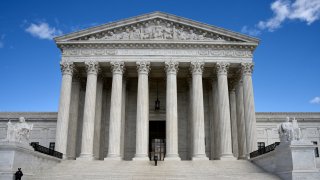
As coronavirus cases surge again nationwide the Supreme Court late Wednesday temporarily barred New York from enforcing certain attendance limits at houses of worship in areas designated as hard hit by the virus.
The court’s action could push New York to reevaluate those restrictions. But the court’s action also won’t have any immediate impact since the two groups that sued as a result of the restrictions, the Roman Catholic Church and Orthodox Jewish synagogues in Brooklyn and Queens, are no longer subject to them.
The groups sued to challenge attendance limits at houses of worship in areas designated red and orange zones, where New York had capped attendance at 10 and 25 people, respectively. But the groups are now subject to less-restrictive rules because they’re now in areas designated yellow zones.
The justices split 5-4 to bar the state from enforcing the restrictions against the groups for now, with new Justice Amy Coney Barrett in the majority. It was the conservative’s first publicly discernible vote as a justice. The court’s three liberal justices and Chief Justice John Roberts dissented.
The justices acted on an emergency basis while lawsuits challenging the restrictions continued. In an unsigned order, a majority of the court said the restrictions “single out houses of worship for especially harsh treatment.”
The move was a shift for the court. Earlier in this year, when Barrett’s liberal predecessor, Justice Ruth Bader Ginsburg, was on the court, the justices divided 5-4 to leave in place pandemic-related capacity restrictions affecting churches in California and Nevada.
New York Gov. Andrew Cuomo, a Democrat, said Thursday the ruling was “more illustrative of the Supreme Court than anything else” and “irrelevant from any practical impact” given that the restrictions have already been removed.
“Why rule on a case that is moot and come up with a different decision than you did several months ago on the same issue?” Cuomo asked in a conference call with reporters. “You have a different court. And I think that was the statement that the court was making.”
The court’s action was a victory for the Roman Catholic Church and Orthodox Jewish synagogues that had sued to challenge state restrictions announced by Gov. Andrew Cuomo on Oct. 6.
The Diocese of Brooklyn, which covers Brooklyn and Queens, argued houses of worship were being unfairly singled out by the governor’s executive order. It noted that in red zones, businesses deemed “essential,” from grocery stores to pet shops, can remain open without capacity limits, though “non-essential” businesses had to close. And in orange zones, most businesses can open without capacity restrictions.
The diocese argued it had previously operated safely by capping attendance at 25 percent of a building’s capacity and taking other measures. Parts of Brooklyn and Queens are now in yellow zones where attendance at houses of worship is capped at 50 percent of a building’s capacity.
“I am gratified by the decision of the Justices of the United States Supreme Court, who have recognized the clear First Amendment violation and urgent need for relief in this case. I am proud to be leading the Diocese of Brooklyn and fighting for our sacred and constitutional right to worship,” Bishop of Brooklyn Nicholas DiMarzio said in a statement.
“I have said from the beginning the restrictions imposed by Governor Cuomo were an overreach that did not take into account the size of our churches or the safety protocols that have kept parishioners safe...Now, with the benefit of the Supreme Court’s ruling, we look forward to continuing the fight in the lower courts to ensure that these unconstitutional restrictions are permanently enjoined once and for all," DiMarzio went on to say.
Agudath Israel of America, an Orthodox Jewish organization with synagogues affected by the restrictions, also sued. The organization argued the governor’s restrictions targeted the Orthodox Jewish community in particular.
New York, for its part, told the court that religious gatherings were being treated less restrictively than secular gatherings that carried the same infection risk, like concerts and theatrical performances, which were prohibited entirely.
Two lower courts had sided with New York in allowing the restrictions on houses of worship to stand. There are currently several areas statewide designated orange zones but no red zones, according to the state’s website that tracks areas designated hot spots.

